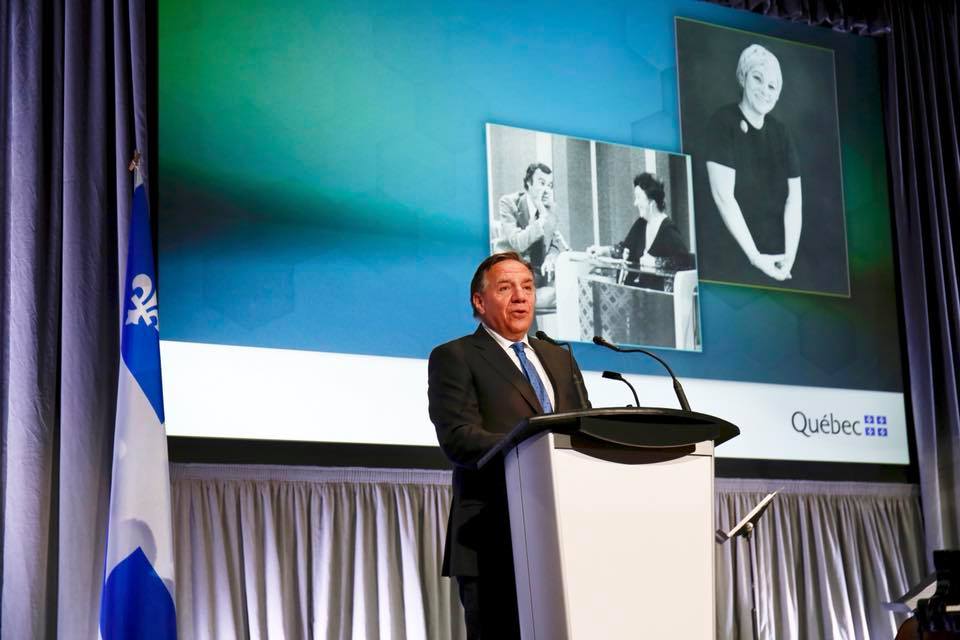
SHERBROOKE, Que. — Quebec Premier Francois Legault laid out a shopping list of demands Thursday that he expects party leaders to address as they woo voters in his province during the coming federal election campaign.
“I won’t support any federal party,” Legault said after a private meeting with Prime Minister Justin Trudeau on the sidelines of a federal cabinet retreat.
“But I will be clear with our demands and I hope that most of these demands will be accepted by as many parties as possible.”
Quebec promises to be a crucial battleground in the run-up to the Oct. 21 vote. Trudeau’s Liberals hope to make gains in the province to make up for expected losses elsewhere. They see potential in rural ridings where the NDP managed to hang on in 2015 as the so-called orange wave that swept Quebec in 2011 dissipated.
The Conservatives have similar hopes, cashing in on the dwindling fortunes of the once-mighty Bloc Quebecois. They’ve also been building links to Legault’s Coalition Avenir Quebec, a right-leaning party with a nationalist bent.
In laying out his laundry list of demands, Legault is evidently hoping to trigger a bidding war for Quebecers’ votes.
He wants the federal government to:
— Give Quebec $300 million to compensate for the costs incurred dealing with the influx of thousands of asylum seekers crossing into Quebec from the United States at unofficial border crossings.
— Fund public transit projects in Montreal and Quebec City.
— Agree to a single federal and provincial income tax return, managed by the Quebec government.
— Give Quebec more power over the selection of immigrants to the province. That includes Legault’s plan to reduce the province’s annual intake by some 20 per cent and to impose a “values test” on applicants.
— Compensation for dairy farmers, who will be hurt by a new North American free trade agreement that gives American producers slightly more access to Canada’s supply managed market.
Legault presented that list to Trudeau on Thursday but said there will likely be more demands to come. He’ll also have a list of things he doesn’t want any federal party to advocate, including the prospect of an oil pipeline from Alberta to eastern Canada. Legault reiterated Thursday that in his view, there is no social acceptance for such a project in Quebec.
On that score, Conservative Leader Andrew Scheer is already offside in his support of reviving the defunct Energy East pipeline proposal. However, Legault noted Thursday that Scheer is onside with the idea of a single tax return.
In the days before the cabinet retreat, Trudeau’s ministers were scattered all over Quebec, making announcements and making the federal Liberals’ presence felt.
Since Legault’s government was elected in October, Trudeau has gone out of his way to find areas of common ground and to play down differences, some of which are huge. Thursday was no different, with Legault saying Trudeau did not shut the door on any of his demands.
However, Trudeau has in the past questioned the need for a single tax return and has rejected the idea of a values test for immigrants.
On Thursday, Infrastructure Minister Francois-Philippe Champagne argued that allowing Quebec to administer a single tax return would throw some 5,000 public servants out of work at federal tax data centres — one of the largest of which is in Shawinigan, in Champagne’s riding.
The Trudeau government is also evidently hoping to dissuade Legault from his determination to reduce immigration levels by stressing the province’s acute labour shortages.
Intergovernmental Affairs Minister Dominic LeBlanc said he and other federal ministers will be meeting with their Quebec counterparts in two weeks to discuss Legault’s plan to reduce immigration. But he said that discussion will have to be “in the context of a broader discussion around labour shortages and … around asylum seekers and the appropriate compensation that the government of Quebec requires.”
In Drummondville earlier this week, LeBlanc said he met with businesspeople who told him “they’re literally refusing contracts and not accepting sales because they do not have enough employees to properly complete the contract.
“So you can imagine the multiplier effect of that over time on the economic growth in Quebec, which frankly is something that is very important for the whole country,” LeBlanc said.
Later Thursday, at the end of the second day of the retreat, the government announced the creation of an advisory panel that will recommend more things the government can do to reduce Canada’s carbon emissions while helping companies cash in on the transition to clean energy.
The panel is co-chaired by Quebec environmentalist Steven Guilbeault and Tamara Vrooman, a former deputy finance minister in British Columbia who now heads Vancity, which bills itself as the country’s largest community credit union. It has not yet been decided whether the panel’s recommendations, which are due in May, will be made public.